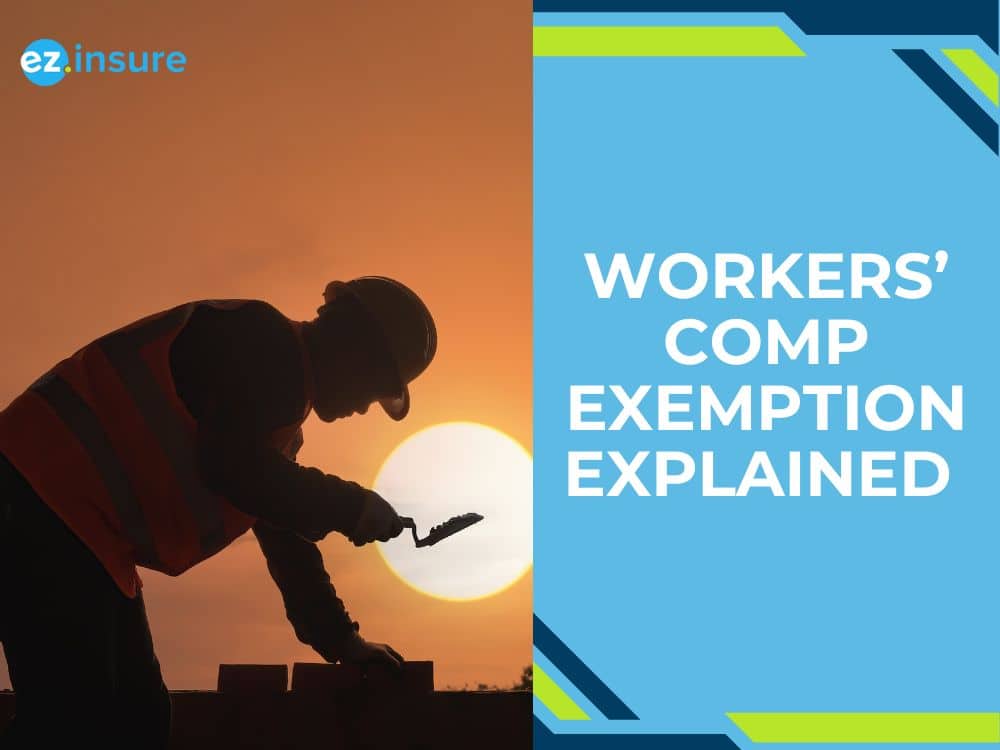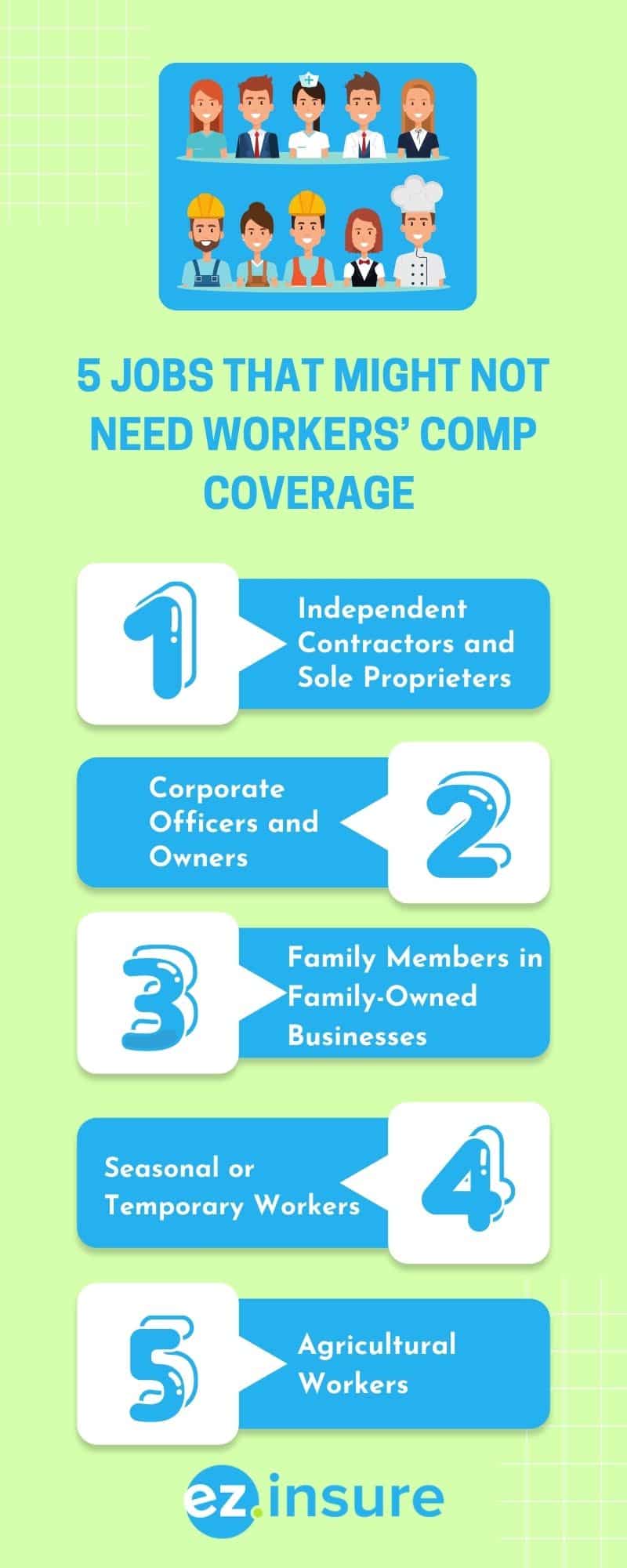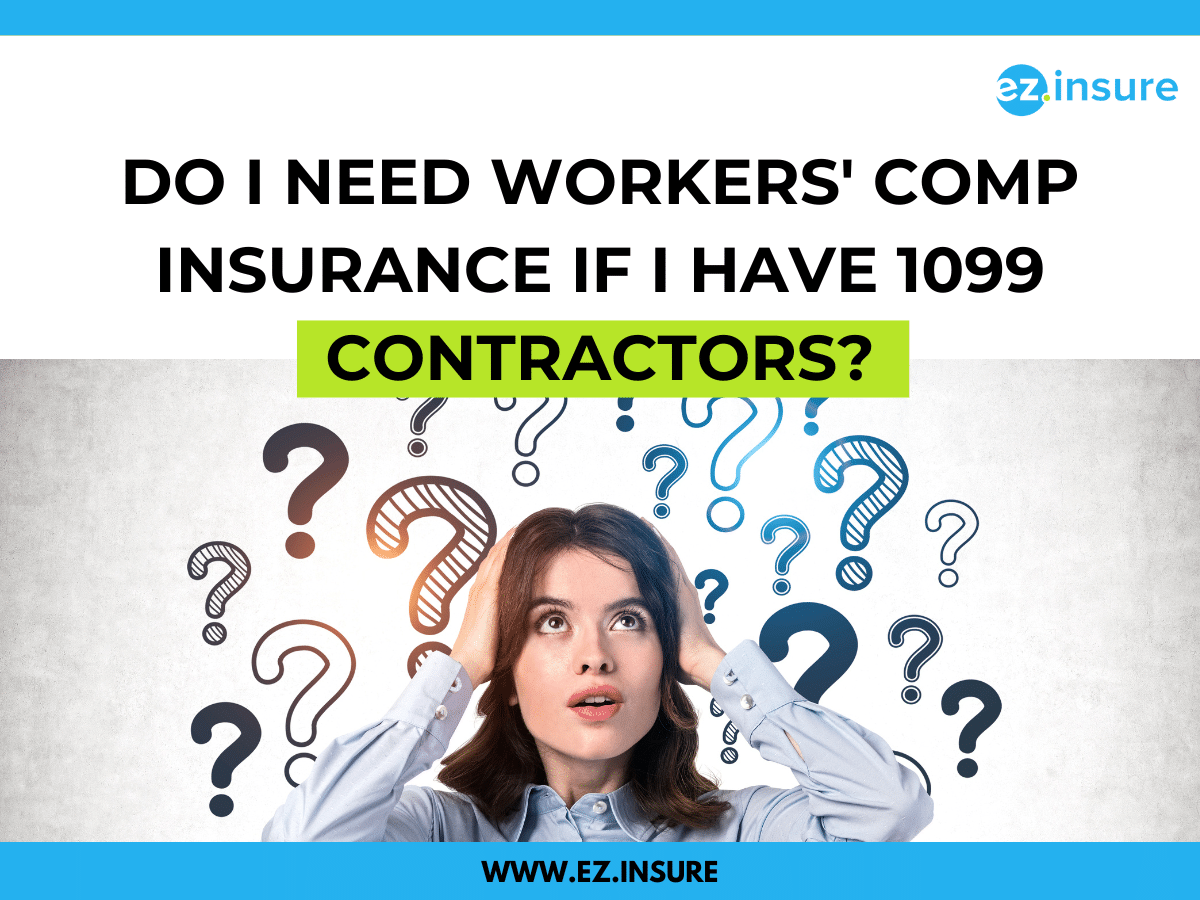Workers’ Compensation is an essential type of commercial insurance coverage for most businesses, but not everyone is required to have it.
To give you a better understanding about what workers’ comp exemptions are, we’ll be discussing:
- The professionals who may qualify for an exemption.
- Varying state laws in regards to exemptions.
- How to file for an exemption.
- The risks of opting out of.
Let’s take a look!

Common Workers’ Comp Exemptions
Workers’ compensation coverage is an essential type of commercial insurance, protecting employees against the costs involved with workplace injuries. While it is legally required in almost all 50 states, certain businesses and individuals are allowed to opt out. Doing so can help small businesses in particular save money, but also comes with some risks.
Now let’s start by exploring the most common exemptions:

Independent Contractors and Sole Proprietors
Since sole proprietors and independent contractors work for themselves, they have no employees. Because of this fact, many states allow them to opt out of workers’ compensation requirements.
Corporate Officers and Owners
High-level executives such as owners of large corporations and corporate officers oftentimes qualify for a workers’ comp exemption. It’s important to note that in this situation, the executive alone won’t receive workers’ compensations benefits, but normal employees are still required to.
Family Members in Family-Owned Businesses
In some states, immediate family members who work for a family business may be able to opt out of workers’ comp requirements. For example, a spouse or child who
works for their family’s restaurant may be eligible for an
exemption in many cases.
Seasonal or Casual Workers
For some professions, work tends to be short term depending on the industry, specific season, or special circumstances. Many states allow workers, who are seasonal or temporary, to opt-out of workers’ compensation requirements. In these situations it’s important to read about the industry-specific requirements in addition to the state requirements.
Agricultural Workers
In some states farm laborers and other agricultural workers can be exempt from workers’ comp requirements. Similarly to temporary workers, it’s important to read up on specific agricultural laws in your state to make sure you’re legally compliant.
State-by-State Workers’ Comp Exemption Variations
As briefly mentioned, each state has its own separate laws in regards to workers’ compensation requirements. While we won’t go through every state’s specific laws, you can find more detailed information by looking at our Workers’ Compensation Insurance Rates and Coverage by State overview.
Here are some examples of states with unique workers’ compensation laws:
- Texas: Private employers don’t have to provide workers’ compensation coverage at all (they are the only state with this law).
- Florida: While construction workers usually face stricter requirements than in many other states, sole proprietors can apply for exemptions.
- California: There are very few exemptions allowed. One of the only types of professionals who may become exempt with specific circumstances are corporate officers.
- New York: While sole proprietors are exempt, many specific types of contractors must be covered.
- Pennsylvania: Unless they employ other people, sole proprietors are exempt.
*It’s important to always check with your state’s labor and workers’ compensation board to fully understand the specific exemption requirements for your state and industry.
How to File for a Workers’ Comp Exemption
- Apply: After finding out if you and your business are eligible for workers’ comp exemptions, you’ll need to apply through your state’s labor department or workers’ compensations board. This is usually as easy as filling out a lengthy application, but sometimes requires a sworn affidavit.
- Required Documents: During the application process you’ll likely need to provide some specific documentation. Standard document requirements include proof of business ownership, proof of family relationships (for family-owned businesses), or proof of your independent contractor status.
- Exemption Renewal: Most states require you to renew your workers’ compensation on a periodic basis. For some states, it’s every year, for others, it’s every couple of years, so be sure to check with your labor board for your local requirements.
Risks of Obtaining a Workers’ Comp Exemption
- Financial Risks: While opting out of your state’s workers’ compensation requirements could save you money upfront, you run the risk of facing expensive out-of-pocket costs if you or an employee gets injured on the job.
- Legal Risks: If you fail to cover an employee who is in fact required to have workers’ compensation coverage you will face steep fines and/or other legal penalties. The same consequences apply if you incorrectly claim an exemption.
If you are eligible for an exemption it’s important that you take the time to weigh your options. While we encourage you to play it safe and get some level of workers’ compensation for your business, it is a personal choice and each option has pros and cons.
Why You May Want Workers’ Comp, Even if You Are Exempt

- High-Risk Professions: If you work in a high-risk industry such as construction, it’s likely worth it to obtain a workers’ compensation policy even if you’re not legally required. This is mainly because the risk of injury is so much higher in these professions in comparison to other ones.
- Protect Your Assets: A workplace injury could result in a lawsuit costing hundreds of thousands of dollars without a workers’ compensation policy in place. In this dreadful situation, many business owners simply cannot afford to keep their company afloat, while also paying the settlement.
- Employee Trust: Having a comprehensive workers’ compensation policy in place shows your employees that you truly care about their health and well-being. This helps to instill a sense of trust and loyalty among team members.
Learn More About Your Options at EZ.Insure
Workers’ compensation insurance is a crucial type of coverage that extends to employees by covering the costs associated with workplace accidents. While there are some benefits of opting out of your state’s requirements, it’s important to first weigh the pros and cons before making a decision.
To learn more about workers compensation coverage and other key business protections, visit our full resource library.
If you’re interested in taking the next step to cover your team, EZ.Insure also provides free quotes, and expert help from licensed insurance agents. To get started, simply fill out the form on the righthand side of the screen or call us at (855)-694-0047.

